Teachers' Domain - Digital Media for the Classroom and Professional Development
User: Preview
Global climate change is altering Alaska's ecosystems. What do you know about changes in your environment? What can you do to help address the growing number of environmental issues that affect your local community?
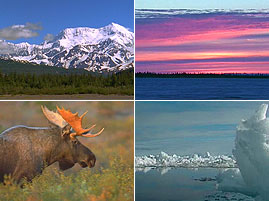
Everybody interacts with nature. For communities whose way of life depends on hunting, fishing, and gathering, the natural environment is especially important. Think about your daily life and your community. In the box below, write down examples of how you personally interact with nature. For example, consider the following questions:
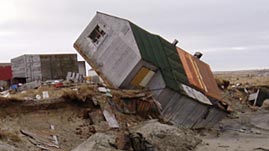
Video: 3m 58s
Throughout history, Earth's climate has experienced natural changes. Recently, however, global climate has been changing at a rapid rate. Over the past few decades, Earth's temperature has increased significantly. In the Arctic, climate change is happening at an even faster pace and is causing observable changes in the environment.
As you work through the rest of this activity, you can refer to the Glossary of Alaska Native and Western Science Terms Document. Download and print the document and keep it on hand as you complete the activity.
Now, watch the video, and then write down below some of the effects of climate change in Shishmaref, Alaska. How do you think these changes will affect eating habits and the natural foods that people harvest? In what other ways will these changes impact the community?
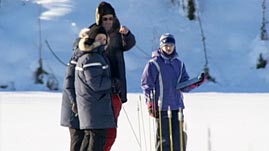
Video: 1m 56s
Scientists observe and study the natural environment to increase understanding of how it functions. In this video, Alaskan students gather field data about lake ice and snow conditions. These students learn about the process of Western scientific research and take part in the collection of valuable data that contributes to the building of scientific knowledge.
Watch the video, and then respond to the following questions in the box below.
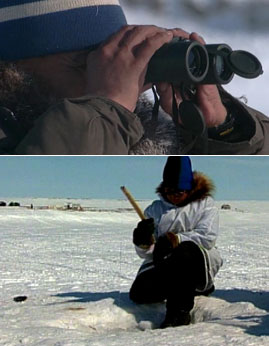
Alaska Native peoples have developed a large storehouse of knowledge about their local environments, based on wisdom collected and shared over generations. This knowledge has been critical to survival. It is based upon detailed observations of winds; weather; storm frequency and intensity; climate; precipitation; water levels in lakes and rivers; animal populations and behaviors; and health of fish, wildlife, and vegetation. Alaska Native peoples understand properties, patterns, cycles, and interdependence in the natural world. This traditional knowledge is passed down, from generation to generation, through an oral tradition of stories and local lore. While Western science regularly uses precision instrumentation to collect data that can be compared mathematically, traditional knowledge tends to be less reliant on instrumentation and is more qualitative and holistic.
Divide into pairs to discuss these questions:
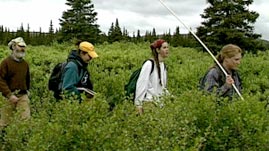
Video: 2m 30s
In the box below, write down your reaction to this video. Consider the following questions:
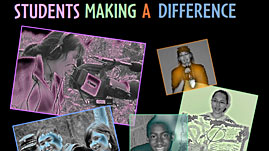
Interactive
Can you as a student take an active role in learning about and caring for the environment? Watch these videos to see what some other students are doing.
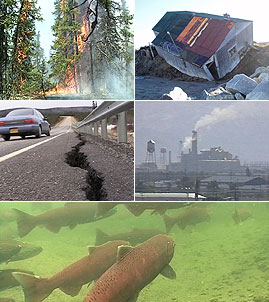
You can investigate concerns about climate change and other environmental issues in your community by reading local newspapers and Web sites, or by talking with adults whom you know (such as parents or neighbors). When speaking with adults, ask them about environmental problems they have noticed in the community. If you do not understand the problem, ask for an explanation or conduct some research on the issue on your own.
Note: When you interview someone, be sure to thank him or her for participating in the project. You may want to send a thank-you letter or give a small gift.
Keep notes about the various community concerns that you come across.
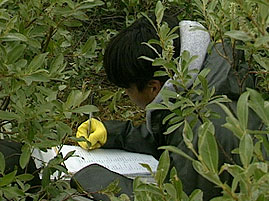
You will now work on a project where you study an issue important to your community, and then create an action plan to resolve the issue or educate others about it. With a partner or group, discuss the environmental issues in your community that particularly interest each of you. Choose one local issue that the group feels most strongly about.
Begin by researching your selected issue and recording your own observations of the problem.
You can shape your research by answering these questions:
When conducting your research, use a variety of sources, including the Internet, books, photographs, and interviews with others. Be sure to keep track of your sources of information.
Compile all observations and notes about your chosen environmental issue.
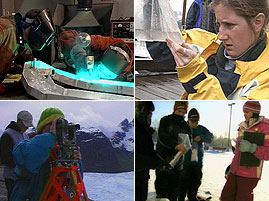
Brainstorm ideas on ways to address the issue. Discuss ways in which both traditional knowledge and Western science can contribute to the process. Be innovative! There are no bad ideas when brainstorming—just write down any and all ideas that you come up with in the box below. Then, discuss the ideas you thought of during your brainstorm. Work together to choose one plan of action that you would like to pursue.
Write down how you will carry out your solution. Depending on the particular issue that you have selected and your proposed solution, you may need to sketch a design or write a list of steps that you will need to follow to accomplish your goal. Think creatively, but remember to keep clear and accurate records.
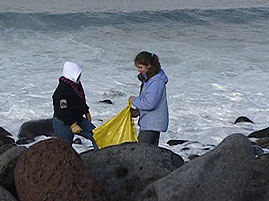
Implement your plan! This may mean making a model or creating a testable version of your idea. Try to implement your proposed solution, or share your ideas about how the problem can be solved with members of your community. Be sure to keep notes on the community's response to your project and about its effectiveness in addressing your issue. You will be presenting your project to the class.
Reflect on the solution that you implemented. What worked? What did not? What would you do differently next time? Why?
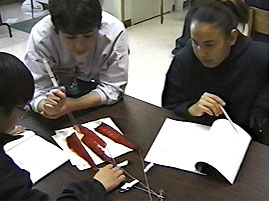
Work with your group to create a presentation to the class that summarizes your project. You can use visual aids, such as photographs, data charts, or diagrams. Again, be creative! This is your chance to educate your peers about an issue that concerns you. Be sure to describe where you got your information—for example, mention the names and jobs or roles of the people whom you interviewed.
Consider these questions as you shape your presentation:
Share your experiences with the class.
To learn more about the effects of climate change in Alaska, check out these video resources:
Explore these Web sites to find out how students can study and care for the environment:
Teachers' Domain, Take Action for Nature and Your Community, published March 13, 2009, retrieved on ,
http://www.teachersdomain.org/resource/ean08.sci.ess.earthsys.sanature/
Media Type:
Self-paced Lesson
WGBH is trying to develop materials that better meet the needs of our users. Please take this brief survey to share how you use these resources and to provide feedback on your experiences using these materials. Take the Survey!
In this media-rich self-paced lesson, students explore human relationships with the natural world, learn how both Alaska Native ways of knowing and Western science can be used to study and help the environment, and take action on a local environmental issue.
This is a student-directed activity. Download and print the Teacher's Guide: Take Action for Nature and Your Community PDF Document for essential background information and suggestions for ways to support the activity.
To help improve this service, please report and describe any standards correlations that you find to be inaccurate.
Academic standards correlations on Teachers' Domain use the Achievement Standards Network (ASN) database of state and national standards, provided to NSDL projects courtesy of JES & Co.
![]()
We assign reference terms to each statement within a standards document and to each media resource, and correlations are based upon matches of these terms for a given grade band. If a particular standards document of interest to you is not displayed yet, it most likely has not yet been processed by ASN or by Teachers' Domain. We will be adding social studies and arts correlations over the coming year, and also will be increasing the specificity of alignment.
You must be signed in to see standards matches for your state.
 Loading Standards
Loading Standards Teachers' Domain is proud to be a Pathways portal to the National Science Digital Library.
Teachers' Domain is proud to be a Pathways portal to the National Science Digital Library.
Major funding for Teachers' Domain was provided by the National Science Foundation.
Teachers Domain® Home | Change Edition
About Teachers' Domain | Contact Us | Privacy Policy | Terms of Use
Teachers' Domain: © 2002-2025 WGBH Educational Foundation | shopPBS Educational Media


